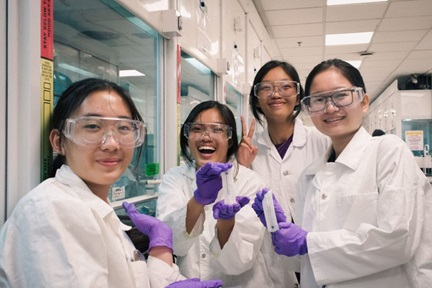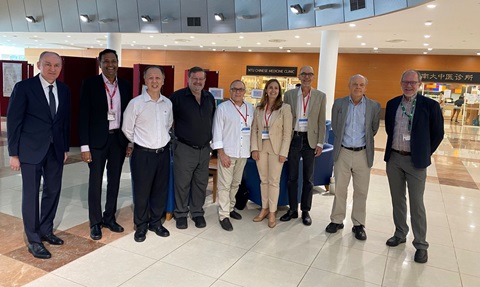The 6th Japan-Singapore-Taiwan-Hong Kong Quadrilateral Symposium on Coordination Chemistry
Assoc Prof Soo Han Sen | School of Chemistry, Chemical Engineering & Biotechnology (CCEB), NTU
The 6th Japan-Singapore-Taiwan-Hong Kong Quadrilateral Symposium on Coordination Chemistry (QSCC 2023), organised by the NTU School of Chemistry, Chemical Engineering & Biotechnology (CCEB) and the NUS Department of Chemistry with support from IAS@NTU, A*STAR, JEOL and Shimadzu, was held from 30 August to 1 September 2023 at the University Hall of NUS.
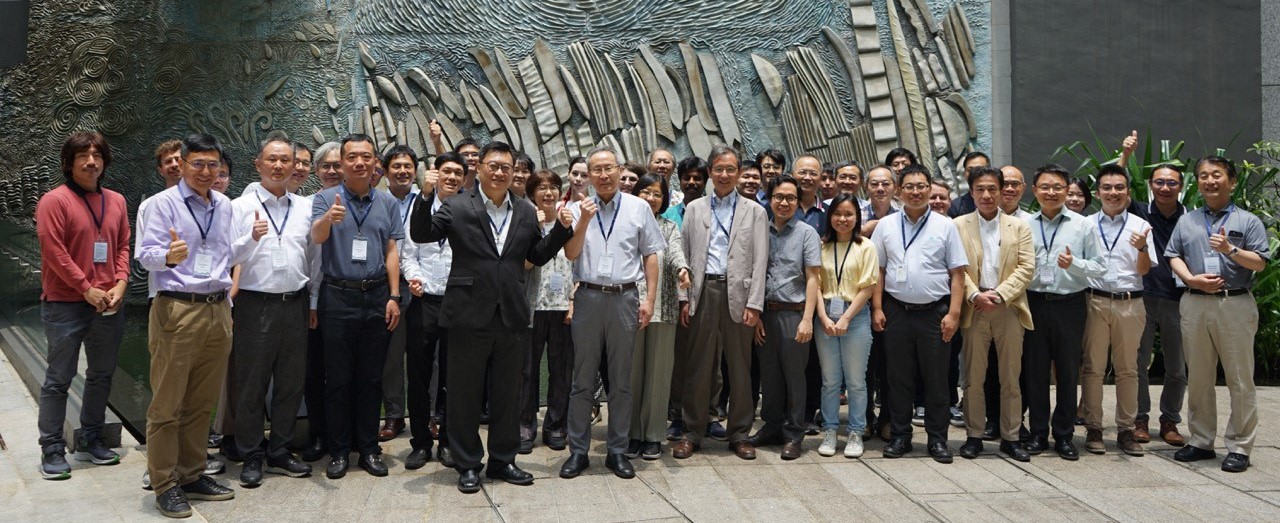
The QSCC series was established to promote collaborations and serve as a platform for scientists to exchange their latest scientific findings in coordination chemistry. The inaugural symposium at Osaka University in 2013 was jointly organised by Prof Takumi Konno (Professor Emeritus, Osaka University and National Taiwan Normal University), Prof Andy Hor (Deputy Chief Executive of Research, A*STAR), and Prof Peng Shie-Ming (Professor Emeritus, National Taiwan University). Since then, the symposia were held in Singapore (2015), Taipei (2016), Hong Kong (2017) and Nagoya (2019), all of which have strong traditions in coordination chemistry. In this 6th symposium of the series, over 30 plenary and invited speakers from Japan, Taiwan, Singapore, and Hong Kong, along with poster presenters and participants, participated in the event in Singapore after a four year hiatus due to the COVID-19 pandemic.
The QSCC 2023 opening ceremony was graced by the Deputy Chief Executive (Research) of A*STAR, Prof Andy Hor, who reminisced about the history of the QSCC series and his insights on how coordination chemistry had shaped the research landscape of Singapore. Prof Ang Wee Han (NUS, Co-Chair of the organising committee) gave the welcome address and he thanked all the sponsors for their generous sponsorships.
The scientific sessions kicked off with the first IAS@NTU-QSCC2023 Plenary Lecture delivered by Prof Mitsuhiko Shionoya (University of Tokyo). He described numerous beautiful supramolecular complexes, most of which were characterised by crystallisation. Notably, through the interlocking of sophisticated metal-organic coordination complexes, molecular rotors could be designed. This was followed by Prof Tzeng Biing-Chiau's (National Chung Cheng University) presentation on the mechanochromic luminescence of gold and platinum complexes and an impressive demonstration of the versatility and power of combining electron microscopy and solid-state nuclear magnetic resonance spectroscopy by Dr Yusuke Nishiyama, a scientist from JEOL.
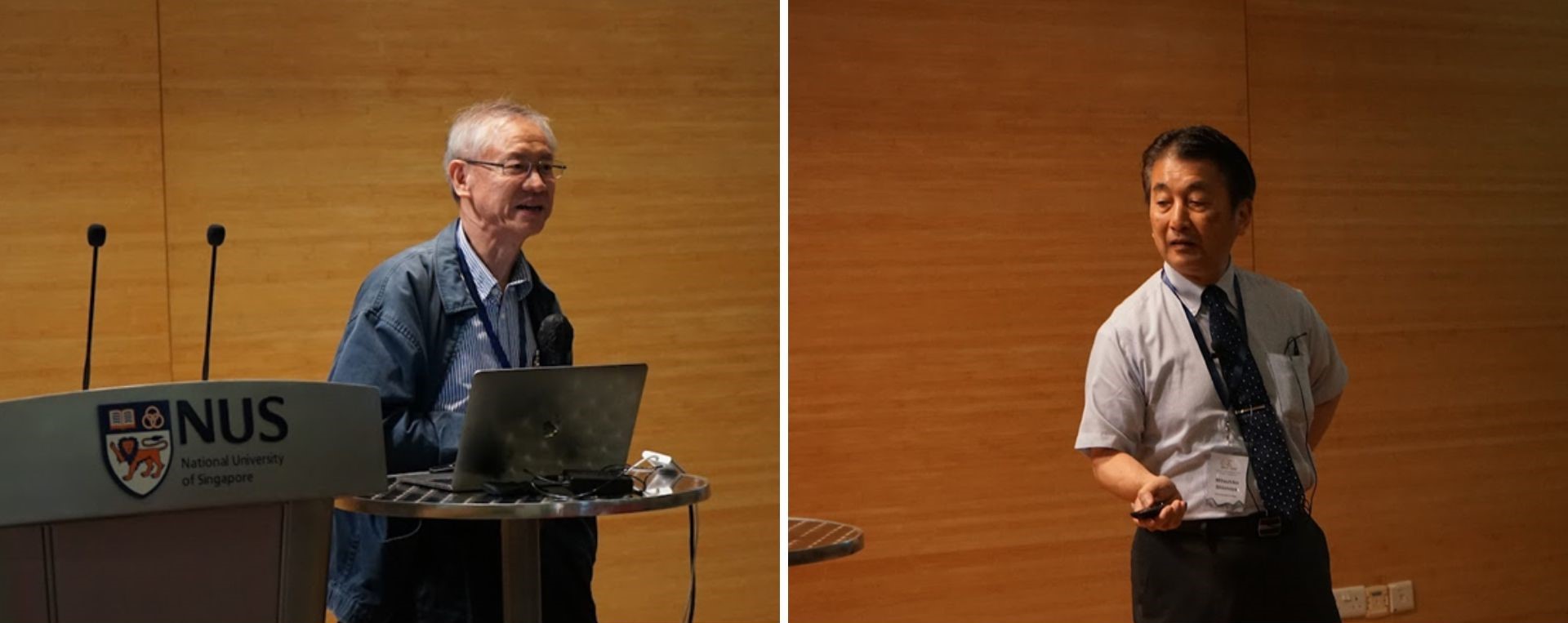
[Left] Opening remarks by Prof Andy Hor (A*STAR and founding organiser of the QSCC series. [Right] Prof Mitsuhiko Shionoya (University of Tokyo, Editor of Chemistry Letters) delivering his IAS@NTU-QSCC2023 Plenary Lecture.
In the session after the tea break, Prof Soo Han Sen (NTU) described his group’s efforts in using vanadium coordination complexes that harvest light energy for the ambient condition photocatalytic oxidative upcycling of most non-biodegradable
plastics. Prof Leung Wa Hung (Hong Kong University of Science and Technology) continued on the theme of oxidative chemistry using cerium (IV) complexes to access bulky, phenoxy radicals. The day ended with Prof Chiu Ching-Wen’s (National Taiwan
University) presentation on the challenging synthesis and characterisation of highly reactive, transient two-coordinate boron radicals.
The following day had a packed schedule starting with the second IAS@NTU-QSCC2023 Plenary Lecture by Prof James Tsai (National Tsing Hua University), who spoke about the elegant organometallic chemistry of molybdenum-molybdenum multiply bonded complexes that exhibited metalloaromaticity. Next, Prof Rei Kinjo (NTU) presented the main group congeners of boron-boron multiply bonded compounds that likewise exhibited aromaticity. Prof Masahito Kodera (Doshisha University) rounded off the morning session by discussing his studies on bimetallic copper complexes for cancer cell-selective cytotoxicity.
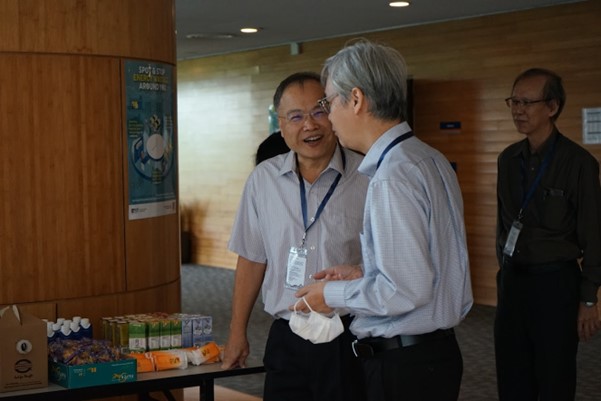
[From left] Prof James Tsai (National Taiwan University) and Prof John Yip (NUS) conversing during the break.
After the lunch break, Prof Takumi Konno (National Taiwan Normal University, Osaka University), one of the founding members of the QSCC series, described his latest effort in constructing elegant metallosupramolecular coordination complexes between gold and the therapeutic agent D-penicillamine. Prof Ho Yu Au-Yeung (University of Hong Kong) highlighted the applications of supramolecular copper catenane complexes for catalysing organic reactions such as the dehydrogenative carbon-oxygen cross coupling of bromodicarbonyl compounds and phenols. Prof Zhang Yugen (Institute of Sustainability for Chemicals, Energy and Environment, A*STAR) wrapped up the day with his talk about the applications of metal organic frameworks as antimicrobial materials, before the participants departed for the banquet at the Singapore Recreation Club.
The final day kicked off with the third IAS@NTU-QSCC2023 Plenary Lecture by Prof Hou Zhaomin (RIKEN Center for Sustainable Resource Science), who impressed the audience with the applications of rare-earth metallocene complexes for the creation of self-healable plastics. Prof Ang Wee Han (NUS) subsequently presented his group’s research in developing ruthenium coordination complexes that could be used as anticancer therapies and antibacterial agents.
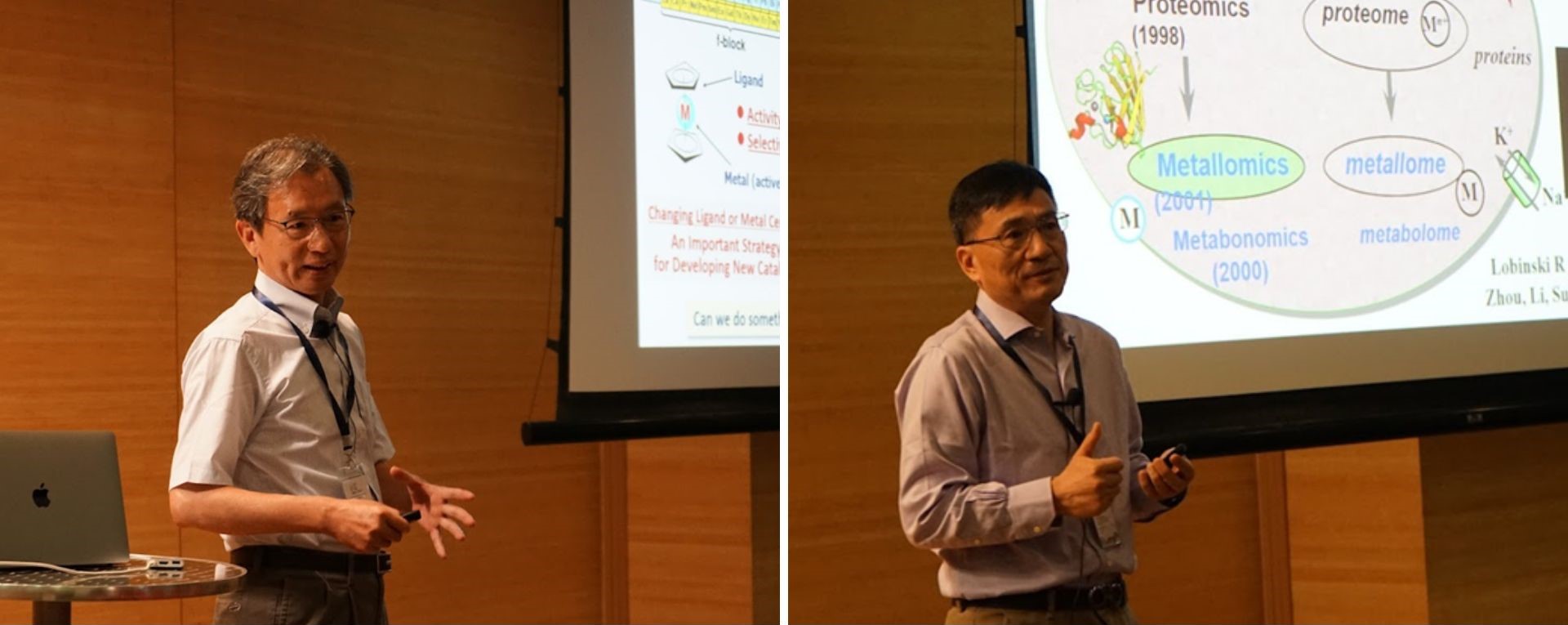
[Left] Prof Hou Zhaomin (RIKEN Center for Sustainable Resource Science) explaining the motivations behind the development of self-healable polymers. [Right] Prof Sun Hongzhe (University of Hong Kong) describing his efforts at the development of bismuth-based therapies for viral diseases such as COVID-19.
In the final session of the symposium, Prof Huynh Han Vinh (NUS), also known as “the carbene guy”, described his group’s multi-year efforts at using carbene complexes and 13 C nuclear magnetic resonance signals to provide insights about the donor strengths of ligands. The symposium concluded with the fourth IAS@NTU-QSCC2023 Plenary Lecture by Prof Sun Hongzhe (University of Hong Kong), who showcased his group’s groundbreaking discovery that bismuth(III) complexes could suppress the replication of viral diseases such as SARS and COVID-19.
Following the concluding remarks by Prof Soo Han Sen (NTU, Co-Chair of QSCC 2023) who expressed his gratitude to all the organisers and participants, the IAS@NTU-QSCC2023 Poster Awards were presented to four outstanding young scientists. The winners include Mr Wong Zhen Xuan (NTU), Dr Yan Chenting (NTU), Ms Machi Hata (Doshisha University) and Dr Handoko Albertus (Institute of Sustainability for Chemicals, Energy and Environment, A*STAR).
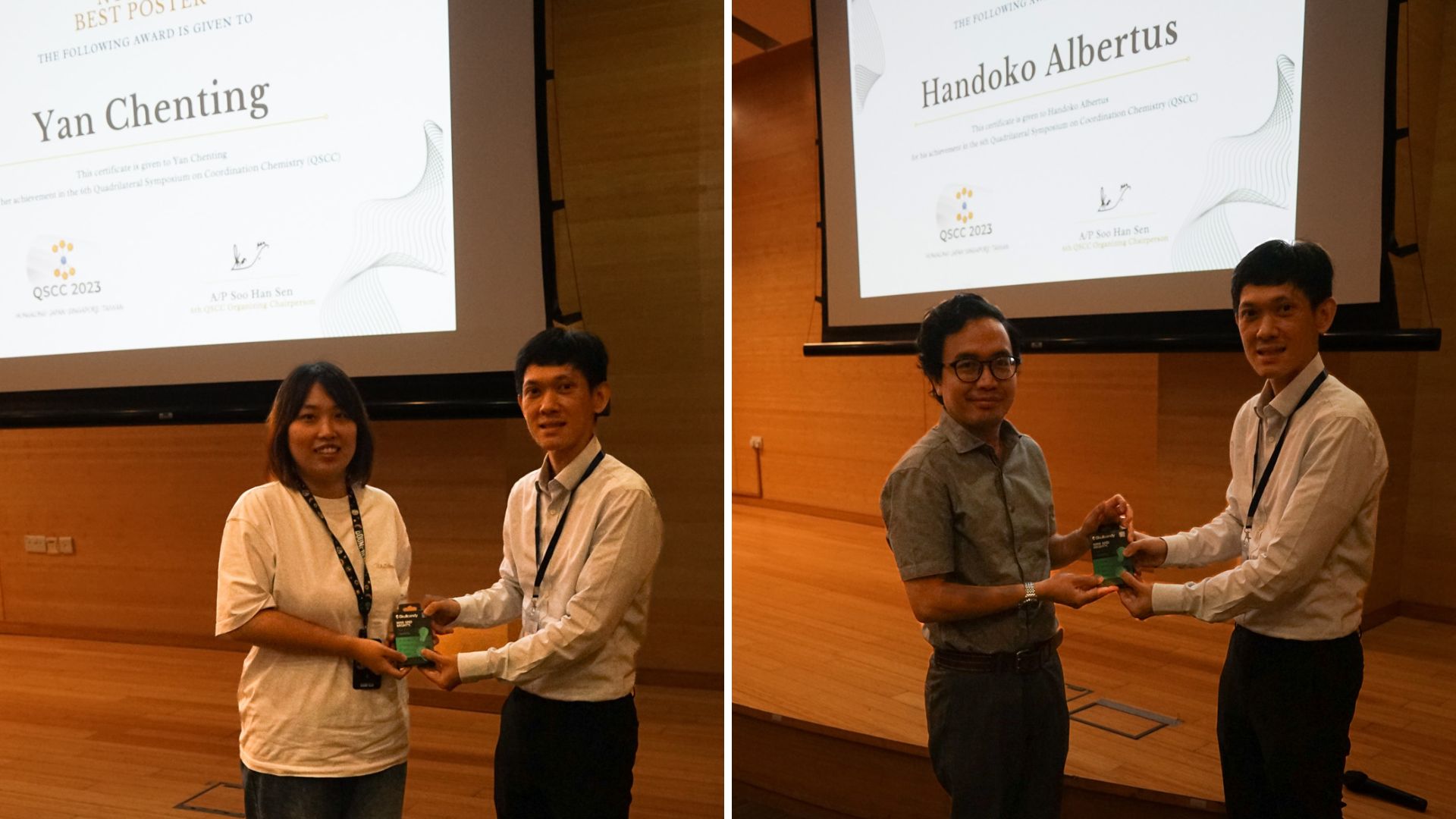
Prof Soo with winners of the poster awards, Yan Chenting and Handoko, sponsored by IAS@NTU.
Overall, the QSCC 2023 showcased some of the latest and most outstanding coordination chemistry in the Asia-Pacific region with topics covering the entire gamut of fundamental studies to biomedical therapies, environmental applications and pharmaceutical development. The speakers departed with new connections made and international collaborations cemented or newly established. The participants unanimously look forward to the next round of the series in Taiwan.














/enri-thumbnails/careeropportunities1f0caf1c-a12d-479c-be7c-3c04e085c617.tmb-mega-menu.jpg?Culture=en&sfvrsn=d7261e3b_1)

/cradle-thumbnails/research-capabilities1516d0ba63aa44f0b4ee77a8c05263b2.tmb-mega-menu.jpg?Culture=en&sfvrsn=1bc94f8_1)

7e6fdc03-9018-4d08-9a98-8a21acbc37ba.tmb-mega-menu.jpg?Culture=en&sfvrsn=7deaf618_1)


